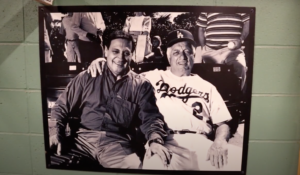Jaime Jarrín, the Dodgers’ retiring Spanish-language voice, reflects on six decades behind the mic
After 64 years behind the mic, Jaime Jarrín, the voice of the Los Angeles Dodgers’ Spanish-language broadcasts, plans to retire at the end of the 2022 season.
Jarrín began calling Dodgers games in 1959, the team’s second year in L.A. after leaving Brooklyn, joining the team’s first Spanish-language voice, René Cárdenas.
This was just four years after Jarrín left his home country of Ecuador. Jarrín already had experience working for radio outlets there, but he says he wanted to achieve things that he couldn’t ever achieve in Ecuador. At the age of 19, he came to the United States with his wife Blanca and his oldest son Jorge.
Jarrín was the news and sports director at Los Angeles radio station KWKW when his bosses picked up the rights to broadcast Dodger games in Spanish.

Through his voice, Jarrín became a link between generations of Spanish-speaking immigrants and the game of baseball.
Since then, he’s been inducted into the Baseball Hall of Fame — the second Spanish language announcer to receive that honor. He is also part of Dodgers Ring of Honor. The National Association of Hispanic Journalists honored him in 1998 with their highest award and Jarrín received a star on the Hollywood Walk of Fame.
In 2017, Jarrín became the longest tenured active baseball broadcaster. His son Jorge, who followed his father into broadcasting, says
Jarrín is now considered a pioneer who paved the way for future Spanish-language baseball broadcasters in the United States.
Now 86 years old, Jarrín had been thinking about the decision to retire for a few months before he made it public. To the L.A. Times, he referred to his job as a vacation because he likes it so much.

Dodger broadcasters Jaime Jarrín (left) and Vin Scully (right) (Photo courtesy of the Jarrín family)
He has called three perfect games – Sandy Koufax in 1965, Tom Browning in 1988 and Dennis Martinez in 1991 — 22 no-hitters, 30 World Series and 30 All-Star games. In 1981, he worked as Dodger pitcher Fernando Valenzuela’s interpreter. Ratings for the station carrying the Dodgers’ Spanish-language broadcasts at the time, KTNQ, more than doubled. Valenzuela is now one of Jarrín’s broadcast partners.
Throughout the years, baseball was not the only subject Jarrín covered. He reported on the Olympics, boxing and soccer matches. He’s also covered non-sporting events, reporting on political meetings, President John F. Kennedy’s funeral and Pope John Paul II’s visit to America.
He also called games with his son Jorge Jarrín for the last six seasons before Jorge retired in February of 2021. They were the first ever father-son broadcasting duo to call baseball games on Spanish-language radio.
“Most people couldn’t believe I chose to retire before my father,” Jorge said.

Jaime (left) and Jorge Jarrín (Photo courtesy of the Jarrín family)
Jamie Jarrín is shifting priorities. He now plans to spend more time with his family: his two sons, grandchildren and travel more. This season, he’s stopped traveling with the team, only calling Dodger home games.
Jarrín was on the road a lot with the Dodgers throughout the years. Baseball came first and his family second. Now it is his family’s time to come first and Dodgers second.
“It hasn’t hit me yet,” Jarrín said of his decision to retire, “but I think, close to the end of the season, I’m sure it will be quite different. I look forward to finishing the season and we’ll see what happens.”
This story was reported by Sofie Bredahl, David Reyes and Daniel Sandoval
